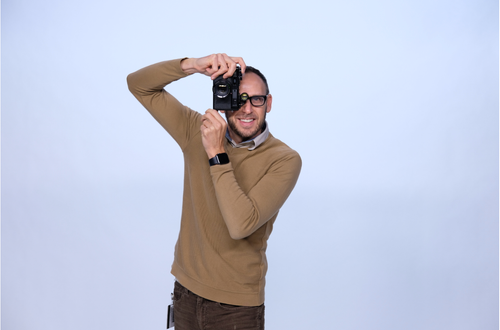Career change: is now the right time?
Jun 16, 2021
6 mins


Journalist
The Covid crisis has changed our relationship with work and, for many of us, it’s changed how we feel about the jobs we’re doing. In fact, analysis shows that the Google search “I want a new job” rose by 194% during the first lockdown in the UK.
As jobs for life become increasingly rare, experts suggest that we will change jobs up to 15 times throughout our career, and change our careers entirely five times. But as we face an epic recession and uncertainty about the future, is it really the right time for a career change? We spoke to three people who’ve questioned their own professional paths in the past few months, and to Rikke Hansen, a career change adviser and entrepreneur, to understand more about how and when switching careers is a good idea.
Here are four crucial questions to ask yourself before you decide if now is the right time for a career change.
1. What’s the main problem?
If you feel you need to change careers, don’t rush into it, advises Rikke Hansen. Take your time to think before you take any drastic action. “The most important thing is to make sure you’re actually solving the right problem, i.e. do you actually need a change in the first place?” she said.
According to Hansen, many of her clients see a career switch as the solution to all kinds of problems, from bad bosses to difficulties in life outside of work. Unfortunately, Covid-19 has confused this landscape even further.
Joel Mitchell works as a marketing director in London for a restaurant group that he co-founded. During the first lockdown, he’s had to process the fact that the future of his job, and his company, is uncertain. “The industry I’m involved in is already quite challenging and volatile. What’s happened with the virus and lockdown has essentially made it impossible,” he said.
Mitchell had thought of career-changing in an abstract way before the crisis but felt tethered to the company he helped create. Now there is a realistic prospect of that company not existing in the future, those thoughts have come to the fore. “For me, it holds quite a lot of fear factor,” he said.
There is, however, one positive to come out of the first lockdown for Mitchell: clarity over the kind of work lifestyle he wants from his future career. Working from home, he says, has meant he can spend more time with his family, including his baby son. “If I had been doing what I usually did, I would probably see him for one hour a day, maximum,” he said. “I’d have missed everything.”
If his company survives the crisis he’d be happy to continue in his current role, on the basis that he could maintain the balance he’s found during the first lockdown by working from home three or four days a week—something that he’s convinced would make him “happier and more relaxed”.
This is an approach Hansen agrees with. “It doesn’t have to be all or nothing,” she said. “If you’re someone who likes what you do, maybe what you need to think about is how you do it.” Changing bosses, companies, or work routines can all be an alternative to changing careers. Moving into consultancy or starting your own company are also good ways to start “changing on the side”, suggests Hansen, while holding down a job for financial stability
The fundamental question to ask yourself, Hansen says, is: “Are you actually doing something that you enjoy that you’re good at and you can see yourself continue doing and developing in?” If the answer is yes, maybe you need to change something other than your career.
2. What can you provide?
For Dr. Sarah Lewis, who lives in Loughborough, the deciding factor was that she couldn’t see any career progression in her job. She was working as an academic researcher in sociology of health and illness, a role she had previously enjoyed. “You leap from fixed-term contract to fixed-term contract,” she said. “There’s no stability… So, it’s difficult really to feel you’re forging a career.” As well as the lack of a clear route forward, she found this instability in her career was holding her back from achieving other goals such as buying a house.
However, the decision to change careers was not easy to make. As Hansen says, “A lot of this is about identity.” One study found that 70% of graduates in the US got a sense of identity from their jobs, rather than a job just being something to do for a living. In this context, changing careers can be a confusing process of redefining ourselves. This might take the form of reframing our skillset to fit another industry or taking on a new role, such as becoming a business owner.
A stint working outside academia, as a temp in a textile company, helped Lewis to make her mind up. “It just sort of opened my eyes that there are other things to do than academia, and if I leave academia the world doesn’t end,” she said.
She then decided to retrain as a doctor. While this is a lengthy process, it’s something she has always wanted to do that will give her the key lifestyle factors missing in academia. “Wherever you start in medicine, you can have a career progression, and that’s the thing that really appeals to me,” she said.
For those who don’t have a dream profession in mind, Hansen suggests considering two factors:
Think about the lifestyle you want. “The kind of work you do for a living also dictates what kind of life you have. It can be a problem having a passion because maybe your passion, if you’re hoping to base your business on that, wouldn’t give you the life that you want,” she said.
Instead of thinking about what you want to do, think about what you can provide. “There’s got to be something in it for both you and for the person who’s going to pay you money,” she said. “What does the world need, in terms of a product or service, that you actually could have an interest in?”
3. Do you trust yourself?
Ultimately, Hansen says, there is no right or wrong time to change careers. “It’s always and never the perfect time to change.” In times of prosperity as in difficult times, there are plenty of factors that can contribute to the success of a career change. However, one of the biggest factors is your own internal landscape. “A lot of this comes down to self-trust, and trusting yourself that you have what it takes,” she said.
This is a quality that Amy Downes, who lives in Leeds, discovered in lockdown when her work as a social media manager dried up. “Weirdly, when I got the message from my last client to say that they were going to have to stop my work, I was really calm about it,” she said.
Throughout her career in the corporate world and as a freelancer, Downes had “this nagging thing in my head” that she should focus on writing, but never had the confidence to pursue it. Now, during the first lockdown, she has decided to transition into journalism.
“[Writing] is what I’m good at,” she said. “It’s what I most enjoy, and it’s the thing I get the most positive feedback from. When I’m sitting down writing articles, I’m just me. I feel so much more confident.”
While her transition is still “in the really scary stage of ‘this could be amazing’ or ‘this could go completely wrong’”, she feels lockdown has given her mental space away from her normal routine. “As hard as the past two-and-a-half months have been, it feels like this is the opportunity that I’ve been waiting for to say, ‘You know what?… I’ve got the opportunity now to finally focus.’ It feels like if not now, then when?”
Confidence was a crucial factor for Lewis in her transition into medicine. While Covid-19 has brought home the reality of working in medicine, she says, “It hasn’t put me off.”
When she was younger, she didn’t have the confidence to go for the career she wanted, but now, in her 30s, she believes it’s now or never. “Why not? If I don’t do it now, I’m not going to have the chance to… if I get into med school, I’ll still be able to have a good 20-year career. So, now’s the time,” she said.
4. When will you start?
This is a question that Hansen believes more and more of us will ask ourselves in the wake of Covid-19, which she expects will accelerate employment trends that were already emerging, such as a decrease in permanent jobs. “I really think that’s something we are all going to be thinking about a lot going forward,” she said. “This whole idea about things going back to normal, good bloody luck! What was ever normal?”
“People get so lost right now because there are so many other things to worry about. But don’t assume it’s the worst case. Take agency.”
Whether or not you do switch careers, Hansen’s advice is to be adaptable and open-minded to transitions. She sees this as an essential skill if you want to drive the changes in your career, rather than having them imposed upon you. “We are going to have to go through several changes over the next 30, 40 years that we’ve got left to work,” she said. “The question is just when do you start?”
Photo: Welcome to the Jungle
Follow Welcome to the Jungle on Facebook, LinkedIn, and Instagram, and subscribe to our newsletter to get our latest articles every day!

More inspiration: Career switch

Meet the CEO making tech careers available to everyone
"I wanted to prove that online learning could also be human-centric" -Martin Ramsin, founder and CEO of CareerFoundry
Feb 01, 2023

The people behind TikTok’s #iquitmyjob movement
Three creators tell the story of why they quit their jobs, and why they let millions of people see it online.
Sep 06, 2022

How honest should you be when quitting your job?
Handing in your notice can be a necessary decision. But should you always tell the truth about your reasons?
Jun 21, 2022

Seth Jaffe changed careers 7 times. Here's what he learned
Jaffe has made a career out of, well — changing careers. How did he do it?
Jun 13, 2022

Should you quit your job, or quit your environment?
Quitting your job can be a difficult but necessary decision. So how do you know if it's the right choice? A Florida-based career coach weighs in.
May 19, 2022
The newsletter that does the job
Want to keep up with the latest articles? Twice a week you can receive stories, jobs, and tips in your inbox.

Looking for your next job?
Over 200,000 people have found a job with Welcome to the Jungle.
Explore jobs